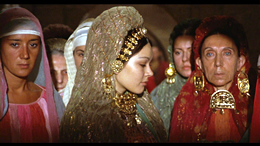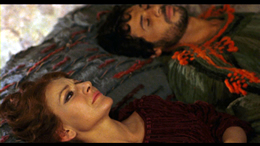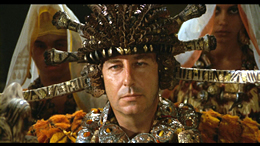
Color, 1969, 111m.
Directed by Pier Paolo Pasolini
Starring Maria Callas, Massimo Girotti, Giuseppe Gentile, Margareth Clementi, Laurent Terzieff
BFI (Blu-Ray & DVD) (UK R0 HD/PAL), E1 (Blu-Ray & DVD) (US R0 HD/NTSC), Raro (DVD) (Italy R0 PAL), Madman (DVD) (Australia R4 PAL) / WS (1.85:1) (16:9)
 After turning the biblical epic upside down with his earthy, innovative The Gospel According to Matthew and performing a similar service with a time-shifting version of the Greek tragedy Oedipus Rex, controversial director Pier Paolo Pasolini (who never met a rocky expanse he didn't like) wrapped up the '60s with his most extreme experiment in that realm to date, Medea. The film gained considerable attention at the time for starring opera legend Maria Callas in her only feature film role (in which she doesn't sing) in the title role, which bears some fascinating parallels with her own personal life. Callas had retired from public performing just a few years earlier and plunged into a passionate
After turning the biblical epic upside down with his earthy, innovative The Gospel According to Matthew and performing a similar service with a time-shifting version of the Greek tragedy Oedipus Rex, controversial director Pier Paolo Pasolini (who never met a rocky expanse he didn't like) wrapped up the '60s with his most extreme experiment in that realm to date, Medea. The film gained considerable attention at the time for starring opera legend Maria Callas in her only feature film role (in which she doesn't sing) in the title role, which bears some fascinating parallels with her own personal life. Callas had retired from public performing just a few years earlier and plunged into a passionate  affair with wealthy shipping magnate Aristotle Onassis, who abruptly left her to marry the widowed Jackie Kennedy in 1968.
affair with wealthy shipping magnate Aristotle Onassis, who abruptly left her to marry the widowed Jackie Kennedy in 1968.
Guided by stories from a wise centaur (Terzieff), young Jason (Olympic triple jumper Gentile) leads a team of Greek explorers to retrieve the Golden Fleece in a remote land where he meets the beguiling sorceress Medea (Callas). She falls in love with him and returns with him to Greece, where Jason plans to use the fleece to retrieve the kingdom stolen from his father. They also have two children, Pheres and Mermeros. However, the whims of the human heart intervene when the king, Creon (Girotti), offers him the princess Glauce (Clementi), and the stage is set for a grand tragic finale.
Though the storyline essentially sticks to the durable Euripides play (albeit with more of an estabilshing opening act), Pasolini's film fractures the narrative  into a string of sensory set pieces revolving around the exotic settings (mostly Syria and Turkey with some intimate interiors back in Italy), lingering views of Callas' commanding face, and a spare, African-based music score. Containing some shocking bursts of violence and implied but potent sensuality, the film also serves as a fascinating directorial bridge between Pasolini's acclaimed experimental films in the '60s and his much more explicit and controversial literary adaptations in the '70s before his untimely death.
into a string of sensory set pieces revolving around the exotic settings (mostly Syria and Turkey with some intimate interiors back in Italy), lingering views of Callas' commanding face, and a spare, African-based music score. Containing some shocking bursts of violence and implied but potent sensuality, the film also serves as a fascinating directorial bridge between Pasolini's acclaimed experimental films in the '60s and his much more explicit and controversial literary adaptations in the '70s before his untimely death.
Despite its pedigree, this film wasn't a particular success upon its initial release and was treated incredibly poorly over the years. The few circulating prints looked absolutely terrible, and video versions weren't much better thanks to rampant element damage and degraded colors. A full-scale restoration in Italy resulted in a more satisfying presentation for Raro's PAL DVD, and even better is the HD master's presentation on Blu-Ray. The best option for Pasolini fans would be the BFI release in the UK, which looks terrific from start to finish and makes the most of the limited but striking color palette with an emphasis on earth tones and bright reds. Like most Italian films of the period, this was shot without sound and looped later in various languages; this release gives the viewer the option of either the theatrical Italian track or the English one, both of which sound canned and never come close to being in synch. However, the default audio option is the Callas restored track, which is the Italian version with Callas' voice performance presented as originally recorded. This is probably the most satisfying option (and it's actually surprising how little dialogue she actually has given her screen time), and optional English subtitles are also provided. (One sequence never dubbed into English after Jason's return home is in Italian in all three versions.) Extras include the Italian trailer, an American teaser, and a liner notes booklet including a new essay about the film by John David Rhodes (who focuses on the story's mythic adaptation aspects and filming locales), excerpts from a 1970 interview with Callas, a 1975 review by Nigel Gearing, and a Pasolini bio by Geoffrey Nowell-Smith. An American Blu-Ray is also avaialble from E1, containing a similar presentation of the restored transfer but only containing the original Italian audio track (with English subtitles) and a weirdly framed Callas documentary.
Reviewed on December 18, 2011.




